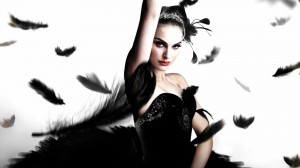BLACK SWAN: 4 ½ STARS
 “Black Swan” is the sort of psychological thriller that doesn’t get made anymore. In a time when most filmmakers are playing it safe, pumping out movies that try to appeal to every single member of the ticket buying audience, Darren Aronofsky has followed up the Oscar nominated success of “The Wrestler” with the kind of emotional noir film that Brian DePalma and Roman Polanski excelled in 30 years ago.
“Black Swan” is the sort of psychological thriller that doesn’t get made anymore. In a time when most filmmakers are playing it safe, pumping out movies that try to appeal to every single member of the ticket buying audience, Darren Aronofsky has followed up the Oscar nominated success of “The Wrestler” with the kind of emotional noir film that Brian DePalma and Roman Polanski excelled in 30 years ago.
Natalie Portman plays Nina, a “beautiful, fearful and fragile” ballerina who dreams of dancing the lead in “Swan Lake.” When she gets the chance the duality of that role — she’ll play both the pure Swan Queen and the sensual Black Swan — begins to bleed into her real life. Consequently it pushes her already brittle psyche to the limit.
As the pressure on Nina builds, so does the paranoia and Aronofsky subtly (and not-so-subtly) drops clues that Nina’s world is two parts perception and only one part reality. Slowly the psychological and body horror builds toward an operatic climax that redefines over-the-top.
I’ve kept the synopsis purposely thin. This is a thriller and as such much of the pleasure of the film will come from learning the details of the story when Aronofsky wants you to. I can tell you Nina is pushed and pulled by an overprotective stage mother (Barbara Hershey), a faded prima donna (Wynona Ryder), a demanding director (Vincent Cassel) and a neophyte dancer named Lily (Mila Kunis). Beyond that, you’ll get no spoilers here.
“Black Swan” benefits greatly from frenetic but beautiful camerawork that is as wonderfully choreographed as any of the dance sequences and the performance of Natalie Portman.
Aronofsky has pulled good performances from everyone — Kunis’s earthiness is a nice counterbalance to Portman’s otherworldliness — but he has pushed Portman to places we’ve never seen her in before. She’s in virtually every scene of the film, and even during the dance scenes, just when you think she isn’t doing her own pirouettes — when the camera cuts from her face to her feet, or when we see her dancing out-of-focus in a mirror — Aronofsky then pans up, or snaps into focus, showing us the dancing is not a cheat.
Neither is the performance. She has physically transformed herself into a twirling 95-pound bun head. But beyond the waifish appearance she throws herself into the emotionally complex role. Echoing Catherine Deneuve in “Repulsion” her grip on reality slowly disintegrates until there is nothing left to hold on to. It is riveting and brave work that sets a new benchmark in her career.
It’s easier to end by summing up what “Black Swan” isn’t. It isn’t understated, it isn’t strictly a horror film, nor is it just a ballet film. It is a wild, primal melodrama that resonates because of the fearless and unapologetically strange work of its star and director.
Leave a Reply
You must be logged in to post a comment.
